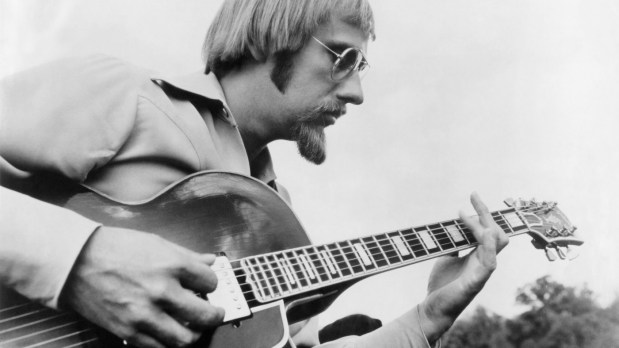In the groove with Dennis Coffey
 Dennis Coffey is still playing Tuesday nights at a Detroit club called the Northern Lights Lounge. It’s what he and his 1963 Gibson Birdland have been doing for the best part of 50 years. He started making a local reputation as a session man in the mid-’60s when he played on Darrell Banks’s “Open the Door to Your Heart” and the classic sides on the Golden World label by J. J. Barnes and others. Later in the decade he was absorbed into the Motown studio band, adding the rock-influenced sounds of a wah-wah pedal and a fuzz box to the more classic approaches of the established Hitsville USA guitarists: Robert White, Eddie Willis and Joe Messina.
Dennis Coffey is still playing Tuesday nights at a Detroit club called the Northern Lights Lounge. It’s what he and his 1963 Gibson Birdland have been doing for the best part of 50 years. He started making a local reputation as a session man in the mid-’60s when he played on Darrell Banks’s “Open the Door to Your Heart” and the classic sides on the Golden World label by J. J. Barnes and others. Later in the decade he was absorbed into the Motown studio band, adding the rock-influenced sounds of a wah-wah pedal and a fuzz box to the more classic approaches of the established Hitsville USA guitarists: Robert White, Eddie Willis and Joe Messina.
It was Coffey who played on Norman Whitfield’s psych-soul productions, like the Temptations’ “Cloud Nine” and “Ball of Confusion” and Edwin Starr’s “War”, as the Motown Sound updated itself to suit a new era. He had his own hit, the funky instrumental “Scorpio”, which highlighted his interest in effects. But he was still playing in the clubs, as we can hear from the rather wonderful product of the latest piece of successful treasure-hunting among previously unknown tapes by the Resonance label: an album titled Hot Coffee in the D: Burnin’ at Morey Baker’s Showplace Lounge, recorded in 1968 with a trio completed by the Hammond organist Lyman Woodard and the drummer Melvin Davis.
Woodard and Davis were musicians with local reputations. The organist went on the road with Martha and the the Vandellas as their musical director. The drummer also toured with Vandellas, and with the Temptations. Like many of the members of the Funk Brothers, they could also be found in the night spots, entertaining their predominantly black listeners with a style of jazz that was heavy on the groove and on the feeling of the blues.
So what we have here is just under an hour of what you’d have heard if you’d wandered into this particular club in 1968: a brand of social music mixing jazz, funk and R&B, completely devoid of pretension, being delivered by highly sophisticated players with a wonderful directness and without any hint of strain. This recording features a handful of lively originals, ultra-cool instrumental versions of Bacharach’s “The Look of Love” and Jimmy Webb’s “By the Time I Get to Phoenix”, and a nice reading of Herbie Hancock’s “Maiden Voyage”. The rhythms are deep in the pocket and the solos aren’t about showing off.
Whenever you’re lucky enough to find yourself in such an environment, you know that no boundaries are being stretched and no rules are being rewritten. But it doesn’t matter. There are truths in this kind of music that are no less valuable for being relatively simple. And while it’s happening you want it to go on for ever.
* The photograph of Dennis Coffey is from the booklet accompanying Hot Coffey in the D, which includes valuable interviews and background material.

sounds great Richard, hopefully not far from what my own band are working on
I believe there a plans afoot to re-issue Lyman Woodard’s effortlessly funky and classic ‘Saturday Night Special’ LP which he recorded for Strata in Detroit…. sleeve design by John Sinclair. Basically, I need a re-mastered freshly pressed 180g vinyl copy….double album…. fat grooves.
I can recommend the Stuart Cosgrove’s book ‘Detroit1967’ for a real insight to this era and place.
Most of the guys in the ‘Snakepit’ were schooled Jazz players. Effortless players.